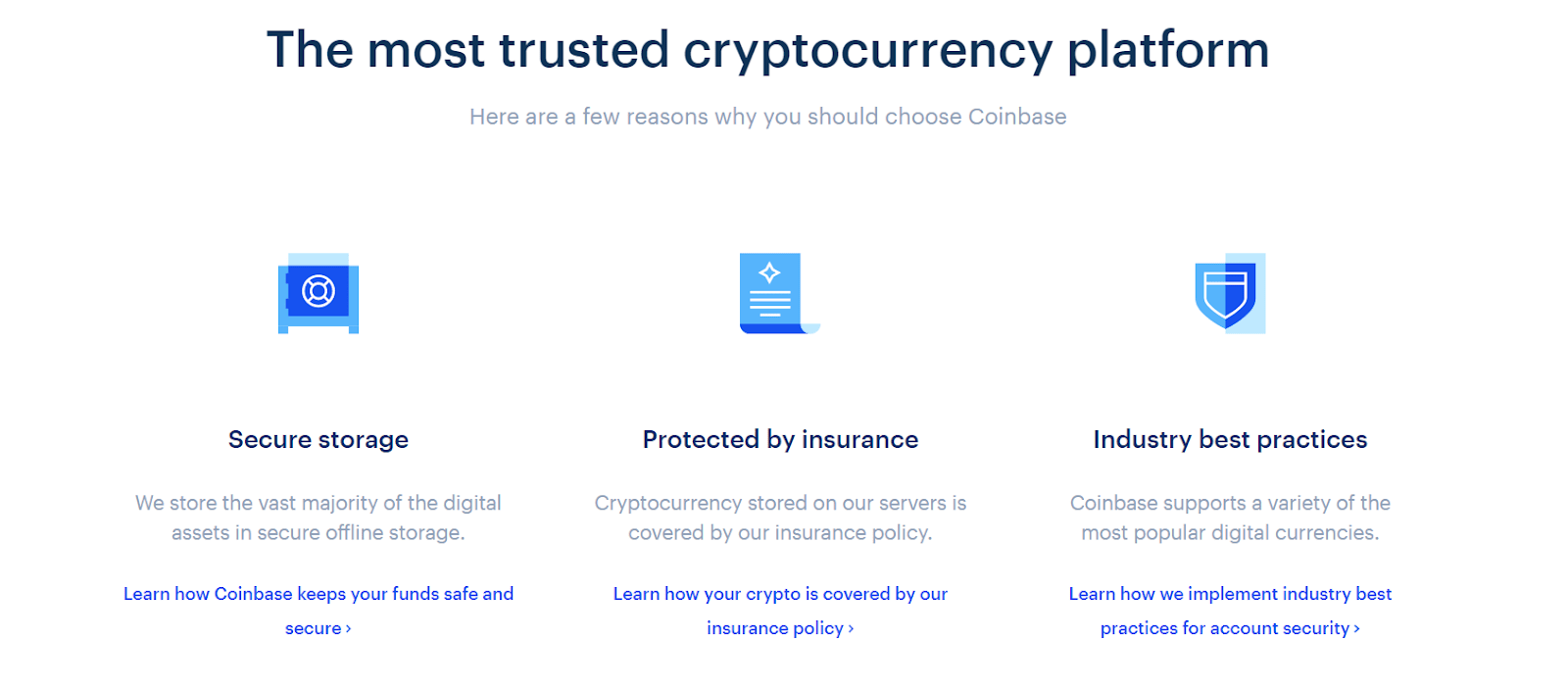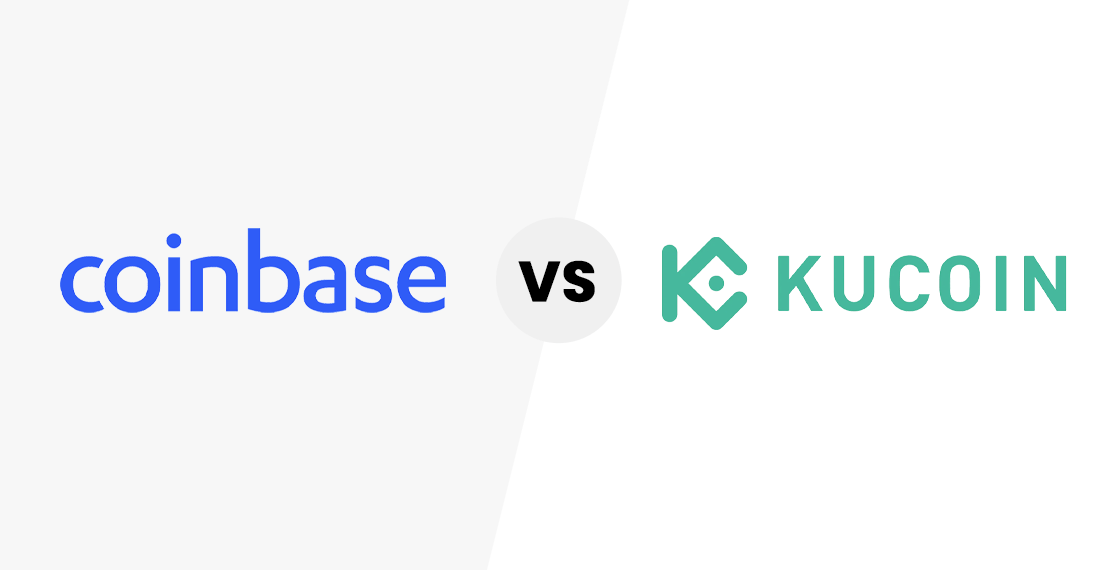If you’re interested in investing in cryptocurrencies, you’re probably wondering which platform is the best for your needs. With the increasing popularity of digital assets, there are now numerous cryptocurrency exchanges to choose from. Two of the most well-known options are Coinbase and Robinhood.
Both Coinbase and Robinhood are highly reputable platforms that have a large user base. However, they have different features and benefits that may make one a better fit for you than the other. Coinbase is a full-scale cryptocurrency exchange that allows users to buy, sell, and trade a wide variety of cryptos. It offers a more extensive range of coins and has a prioritization of security with a significant amount of their assets held in cold storage to ensure user’s funds are safe from unauthorized access.
Robinhood, on the other hand, is primarily known as a commission-free stock trading app. It wasn’t until recently that they added support for cryptocurrencies. While Robinhood’s selection of cryptocurrencies is more limited compared to Coinbase, the app is excellent for beginners who want to get started with investing in digital assets. Robinhood is known for its user-friendly interface and streamlined process, making it easy for newcomers to navigate their first cryptocurrency purchase.
When deciding between Coinbase and Robinhood, it’s essential to consider your specific needs and goals. If you’re looking for a wide variety of cryptocurrencies and prioritize security, Coinbase may be the better option for you. On the other hand, if you’re new to cryptocurrency investing and want a simple and user-friendly platform, Robinhood may be a better fit. Ultimately, doing your research and understanding how each platform works will help you make an informed decision that aligns with your financial goals.
- Final take
- The key differences between Coinbase and Robinhood
- Factors to consider when choosing between Coinbase and Robinhood
- Coinbase vs Robinhood Cryptos available
- Coinbase: Extensive selection of cryptocurrencies
- Robinhood: Limited crypto options
- Comparison: Number and variety of available cryptocurrencies
- Coinbase vs Robinhood Fees
- Coinbase: Transparent fee structure
- Robinhood: No Fees for Crypto Trading
- Comparison: Fee structure and cost considerations
- Coinbase vs Robinhood Security
- Coinbase: Robust security measures
- Robinhood: Controversies and security concerns
- Comparison: Security features and reputation
- Coinbase vs Robinhood Wallets
- Frequently Asked Questions:
- What is Coinbase and Robinhood?
- What are the main differences between Coinbase and Robinhood?
- Which exchange is better for beginners?
- Is Coinbase more secure than Robinhood?
- Video:
- Coinbase Pro vs Robinhood App In 2022 – Which Is Better?
Final take
When it comes to choosing between Coinbase and Robinhood, it ultimately depends on your individual financial goals and preferences. Both platforms offer unique features and benefits that can cater to different types of investors.
For those looking to engage in more advanced trading and take advantage of a wide range of cryptocurrencies, Coinbase may be the better option. With its long-standing reputation and extensive list of supported coins, Coinbase is widely regarded as one of the most established and reputable cryptocurrency exchanges in the industry.
On the other hand, Robinhood offers a more beginner-friendly interface and a larger user base. This makes it a great choice for individuals who are just getting started with cryptocurrency trading and want a simple and easy-to-use platform. While Robinhood initially started as a stock trading platform, its expansion into the cryptocurrency market has made it a popular choice for many.
Another important consideration is the amount of cryptocurrencies available on each platform. Coinbase supports a larger selection of cryptos, while Robinhood offers a more limited variety. If having access to a greater number of coins is critical to your investment strategy, Coinbase may be the better option.
Security is always a concern when dealing with any financial platform, especially when it comes to cryptocurrencies. Both Coinbase and Robinhood have implemented robust security measures to protect user funds. Coinbase takes security to the next level by storing the majority of user funds in cold storage, which is offline and less susceptible to unauthorized access. Robinhood also has excellent security measures in place, but their funds may be more prone to potential hacking attempts.
Ultimately, the decision between Coinbase and Robinhood will come down to personal preference and how the platforms align with your specific investment needs. It is recommended to conduct further research and comparison to find the platform that suits you best.
The key differences between Coinbase and Robinhood

When it comes to choosing a cryptocurrency exchange, Coinbase and Robinhood are two of the most popular options available. While both platforms allow you to buy and sell cryptocurrencies, there are several key differences that you should consider before making a decision.
- Authorized and regulated: Coinbase is a fully authorized and regulated cryptocurrency exchange, which means it operates in compliance with relevant financial regulations. On the other hand, Robinhood is primarily a stock trading platform that has expanded to offer cryptocurrency trading, but it is not specifically an authorized cryptocurrency exchange.
- Wide range of cryptocurrencies: Coinbase offers a wide range of cryptocurrencies for trading, including some of the most well-known ones such as Bitcoin, Ethereum, and Litecoin. Robinhood, on the other hand, initially started with only Bitcoin and Ethereum, but has since expanded to offer a limited selection of additional cryptocurrencies.
- User experience: Coinbase is known for its user-friendly interface and excellent customer support, making it easier for beginners to navigate the world of cryptocurrency trading. Robinhood, on the other hand, is designed with simplicity in mind and appeals to users who prefer a more streamlined experience.
- Security: Coinbase stores the majority of its users’ cryptocurrencies in cold storage, which provides an added layer of security against unauthorized access. Robinhood, on the other hand, does not offer the same level of security as Coinbase, as it is primarily a stock trading platform that has expanded to include cryptocurrency trading.
- Trading options: Coinbase is known for its advanced trading features, which allow users to execute more sophisticated trades such as limit orders and stop orders. Robinhood, on the other hand, offers a simpler trading experience, with fewer options for advanced trading strategies.
Ultimately, the choice between Coinbase and Robinhood depends on your specific needs and preferences. If you’re looking for a wide range of cryptocurrencies, excellent customer support, and a more secure platform, Coinbase may be the better option for you. On the other hand, if you’re primarily interested in stock trading and prefer a simpler interface, Robinhood may be a more suitable choice. It’s important to consider the amount of experience you have with cryptocurrency trading and what features you prioritize when making your decision.
Factors to consider when choosing between Coinbase and Robinhood

When deciding between Coinbase and Robinhood as your preferred cryptocurrency exchange, there are several important factors to consider:
- Availability of cryptocurrencies: Both Coinbase and Robinhood offer a range of cryptocurrencies to trade. However, Coinbase supports a larger variety of cryptos, making it a better option if you want access to a wider selection of digital assets.
- User interface and ease of use: Coinbase and Robinhood have different user interfaces, so it’s essential to consider which platform is more intuitive and comfortable for you to work with. Both platforms offer user-friendly interfaces, but you may want to test them out to determine which one you prefer.
- Security measures: Security is crucial when dealing with cryptocurrencies. Coinbase has a long-standing reputation for being one of the most secure cryptocurrency exchanges available. They store the majority of user funds in cold storage, which is offline and more secure against unauthorized access. Robinhood, on the other hand, has experienced some security issues in the past. While they have taken steps to improve security, Coinbase may still be a better option for those prioritizing security.
- Financial services: If you’re looking for a cryptocurrency exchange that offers additional financial services, such as loans or staking, Coinbase is the better choice. Coinbase provides various financial services that can help you make the most out of your cryptocurrencies.
- Customer support: In terms of customer support, Coinbase has a better reputation for providing prompt and reliable assistance to its users. Robinhood has faced criticisms for delayed responses and lackluster support, making Coinbase the preferred option if customer support is important to you.
- Starting investment amount: If you’re just getting started in the cryptocurrency market and have a limited budget, Robinhood may be a more suitable choice. Robinhood offers commission-free trading and has a low minimum investment requirement, making it accessible to users with smaller budgets.
- Scale of operation: Coinbase is a more established and larger cryptocurrency exchange compared to Robinhood. If you’re looking for a platform with a larger user base and higher trading volumes, Coinbase is the better option.
In conclusion, both Coinbase and Robinhood have their strengths and weaknesses. Ultimately, the choice between the two depends on your specific preferences and needs as a cryptocurrency investor. It’s important to consider factors such as the variety of available cryptocurrencies, security measures, user interface, financial services, customer support, starting investment amount, and the scale of operation before making a decision.
Coinbase vs Robinhood Cryptos available

When comparing Coinbase and Robinhood, one important factor to consider is the range of cryptocurrencies available on each platform. Both exchanges offer a variety of cryptos, but there are some differences in the offerings.
Coinbase:
Coinbase is known for its wide selection of cryptocurrencies. It offers over 50 different digital assets for users to choose from. This includes popular coins like Bitcoin, Ethereum, and Litecoin, as well as lesser-known altcoins. Coinbase also continuously adds new cryptocurrencies to its platform, so there may be even more options available in the future.
Robinhood:
While Robinhood is primarily known as a platform for trading stocks, it also allows users to buy and sell cryptocurrencies. However, Robinhood’s selection of cryptocurrencies is more limited compared to Coinbase. At the moment, Robinhood offers seven different cryptos: Bitcoin, Ethereum, Bitcoin Cash, Litecoin, Dogecoin, Ethereum Classic, and Bitcoin SV.
Which is better?
When it comes to the sheer number of cryptocurrencies available, Coinbase is the clear winner. With over 50 options, Coinbase provides a wide range of choices for users looking to diversify their crypto holdings. However, if you’re just getting started with cryptocurrencies and are primarily interested in the most well-known coins, Robinhood’s selection may be more than enough.
It’s also important to note that Coinbase is known for its security measures, such as storing the majority of customer funds in cold storage and offering insurance against unauthorized access. While Robinhood has security measures in place as well, Coinbase’s reputation in the financial and cryptocurrency industry for security is generally considered to be better.
In conclusion, if you’re looking to find more cryptocurrencies and have a larger scale of options, Coinbase is the better choice. However, if you’re just starting out or primarily interested in the most popular cryptocurrencies, Robinhood may work better for your needs.
Coinbase: Extensive selection of cryptocurrencies

When it comes to choosing a cryptocurrency exchange, having a wide range of options is an excellent advantage. Coinbase offers one of the most extensive selections of cryptocurrencies available, making it an ideal choice for investors and traders looking to explore the vast world of digital assets.
With more than (подставить amount) cryptocurrencies listed on its platform, Coinbase stands out as a top choice for those interested in diversifying their portfolio. Whether you’re a beginner or an experienced trader, Coinbase’s extensive selection provides you with the opportunity to invest in a variety of cryptocurrencies, from well-known names like Bitcoin and Ethereum to lesser-known altcoins.
One of the main reasons why Coinbase is so popular is its strict adherence to financial regulations. The exchange operates legally and transparently, ensuring that users’ funds are secure and protected. Coinbase also implements a multi-signature cold storage system to store the majority of its customers’ assets offline, reducing the risk of unauthorized access or hacking.
In addition to its extensive selection of cryptocurrencies, Coinbase also offers a user-friendly interface that makes it easy for beginners to get started. The platform provides a simple and intuitive way to buy, sell, and trade cryptos, making it an excellent choice for those who are new to the world of cryptocurrency.
Furthermore, Coinbase has been in the cryptocurrency industry for several years and has built a solid reputation as a trustworthy and reliable exchange. Its long-standing presence in the market has allowed the company to scale its operations and provide users with a better overall experience.
If you’re looking for a cryptocurrency exchange with an excellent selection of cryptocurrencies and a proven track record, Coinbase may be the perfect choice for you. Whether you’re a beginner or an experienced trader, Coinbase’s extensive variety of cryptos and user-friendly interface make it a top contender in the world of digital assets.
Robinhood: Limited crypto options

While Robinhood gained popularity as a financial platform for stock trading, its crypto offerings are limited compared to Coinbase. If you’re interested in exploring a wide range of cryptocurrencies, Coinbase might be a better choice for you.
Robinhood currently supports a limited number of cryptocurrencies, including Bitcoin, Ethereum, Litecoin, and Bitcoin Cash. While these are some of the most well-known cryptocurrencies, it falls short compared to the extensive list of cryptos available on Coinbase.
Additionally, Robinhood does not offer cold storage options, which means that your cryptocurrencies are stored online. This can be a potential security risk, as online wallets are more susceptible to hacking attempts and unauthorized access.
On the other hand, Coinbase offers an excellent cold storage option, known as Coinbase Wallet. This means that you can safely store your cryptocurrencies offline, away from potential cyber threats.
Furthermore, if you’re looking to find detailed information about various cryptocurrencies, Coinbase provides a more comprehensive platform. It offers detailed charts, historical data, and market insights to help you make informed decisions about your investments.
While Robinhood does provide basic information, Coinbase’s user interface and tools are designed specifically for cryptocurrency trading. Whether you’re a beginner or an experienced trader, you’ll find that Coinbase offers a more extensive set of features for working with cryptocurrencies.
Comparison: Number and variety of available cryptocurrencies
When it comes to the number and variety of available cryptocurrencies, both Coinbase and Robinhood offer a decent selection. However, there are some differences worth considering if that’s an important factor for you.
Started in 2012, Coinbase has been one of the leading cryptocurrency exchanges in the market. It offers a wide range of cryptocurrencies, including some of the most popular ones like Bitcoin, Ethereum, and Litecoin. With over 40 different cryptos available, Coinbase provides a good amount of options for investors.
On the other hand, Robinhood, which is primarily a commission-free stock trading platform, began offering cryptocurrency trading in 2018. While it originally started with only Bitcoin and Ethereum, it has since expanded its selection to include more cryptocurrencies.
If you’re looking for a larger variety and scale of cryptocurrencies, Coinbase might be the better choice for you. However, if you’re just getting started in the cryptocurrency world and want a simple and user-friendly platform that offers a limited number of cryptos, Robinhood could be a good option.
It’s worth mentioning that Coinbase is known for its excellent cold storage security measures, which prioritize safeguarding users’ funds from unauthorized access. This adds an extra layer of protection for those concerned about the security of their investments.
In summary, while both Coinbase and Robinhood offer a decent range of cryptocurrencies, Coinbase stands out with its larger selection and excellent security measures. However, if you’re a beginner and prefer a simpler platform with fewer options, Robinhood could still work well for you.
Coinbase vs Robinhood Fees
When it comes to fees, Coinbase and Robinhood offer different pricing structures for their users. Understanding the fees associated with each platform is important in determining which one is best suited for your needs.
Coinbase Fees:
- Coinbase has a tiered fee structure based on the trading volume of its users. The more you trade, the lower the fee percentage you will pay.
- The fees can range from 1.49% for small trades to 0.50% for larger trades.
- Coinbase also charges a fee for depositing and withdrawing funds from your account.
- There may be additional fees for certain payment methods.
Robinhood Fees:
- Robinhood offers commission-free trading, which means you won’t pay any trading fees when buying or selling cryptocurrencies.
- However, Robinhood makes money through its order routing practices, which may result in a less favorable execution price for your trades.
- There are also fees for cryptocurrency transfers to external wallets and for trading on the Robinhood Gold premium service.
While Coinbase charges trading fees, it offers a more transparent fee structure that can benefit users who trade larger amounts. On the other hand, Robinhood’s commission-free trading may be more suitable for users who trade smaller amounts or are just getting started in the cryptocurrency market.
It’s important to note that both platforms may have additional fees for certain transactions or for unauthorized account access. It’s always recommended to review each platform’s fee structure and terms of service before deciding which one is better for your financial needs.
Coinbase: Transparent fee structure

One of the key factors to consider when choosing a cryptocurrency exchange is the fee structure. Coinbase is known for its transparent fee structure, making it easier for users to understand the costs associated with trading.
When you buy or sell cryptocurrencies on Coinbase, you’ll be charged a fee. The fee is based on a percentage of the transaction amount and varies depending on the type of transaction and the amount being traded. Coinbase provides clear information about these fees on their website, so you can easily calculate and understand what you’ll be paying.
This transparent fee structure is important because it helps you make informed decisions about your trades. Knowing exactly how much you’ll be charged can help you plan your investments better and avoid any surprises.
Coinbase also offers different fee structures for different types of transactions, such as Coinbase Pro, which is designed for more experienced traders. This allows you to choose the fee structure that works best for your needs and trading style.
Additionally, Coinbase offers a “wallet” service that allows you to store your cryptocurrencies securely. The wallet is protected with cold storage, which means your cryptos are stored offline, making them less vulnerable to unauthorized access.
In summary, Coinbase’s transparent fee structure and excellent security measures make it a popular choice among cryptocurrency traders. Whether you’re just getting started or you’re a seasoned investor, Coinbase offers a user-friendly platform to buy, sell, and store cryptocurrencies.
Robinhood: No Fees for Crypto Trading

When it comes to cryptocurrency trading, Robinhood has made a name for itself by offering a unique advantage – no fees. Unlike many other platforms, Robinhood allows users to trade cryptocurrencies without charging any transaction fees. This has made it a popular choice among both experienced traders and newcomers to the crypto space.
Robinhood’s decision to offer fee-free trading has been well-received by the crypto community. By eliminating transaction fees, Robinhood has made it easier and more accessible for people to get started with cryptocurrency trading. Whether you’re a seasoned trader looking to scale your investments or a beginner trying to dip your toes in the crypto market, Robinhood’s fee-free trading policy makes it an excellent choice.
One of the most significant advantages of Robinhood’s no-fee policy is the ability to trade small amounts of cryptocurrency without worrying about fees cutting into your profits. This allows traders to experiment with different cryptocurrencies and strategies without the fear of losing a significant amount of money in fees. It’s a great way to learn and find what works best for you without the financial burden of fees.
Another advantage of Robinhood’s fee-free trading is the user-friendly interface and intuitive design of the platform. This makes it easier for users to navigate and understand the world of cryptocurrencies. Robinhood provides real-time market data, price charts, and news updates to keep you informed and make informed decisions on your trades.
However, it’s important to note that Robinhood is primarily a stock trading platform that has expanded to include cryptocurrency trading. While Robinhood offers a selection of popular cryptocurrencies like Bitcoin, Ethereum, and Litecoin, it may not have the extensive variety of cryptocurrencies that other dedicated crypto exchanges offer. If you’re looking to trade more obscure or niche cryptocurrencies, you may find better options on other platforms.
Furthermore, it’s worth mentioning that Robinhood’s fee-free trading policy may have some limitations. The platform operates on a “maker-taker” model, meaning that while there are no fees for executing trades, users may face additional costs if they place unauthorized trades or use margin borrowing. It’s important to read and understand Robinhood’s terms and conditions to ensure you’re aware of any potential charges that may be applicable to your trading activities.
In conclusion, Robinhood’s fee-free trading policy makes it an attractive option for those looking to enter the world of cryptocurrencies without incurring additional costs. The platform’s user-friendly interface and no-fee structure offer excellent opportunities for traders to learn, experiment, and make informed decisions. However, it’s essential to be aware of any potential limitations and to understand the platform’s terms and conditions before getting started.
Comparison: Fee structure and cost considerations
When choosing a cryptocurrency exchange, one of the most important factors to consider is the fee structure. Both Coinbase and Robinhood charge fees for their services, but the way they structure these fees can vary.
Coinbase:
- Coinbase has an excellent reputation in the crypto industry for being trustworthy and reliable.
- They charge fees based on a percentage of the transaction amount.
- For transactions under $200, Coinbase charges a fee of $0.99.
- For transactions above $200, the fee is 1.49% of the transaction amount.
- In addition to these fees, Coinbase also charges a spread, which is the difference between the buying and selling prices of a cryptocurrency.
Robinhood:
- Robinhood is a commission-free trading platform that is more focused on traditional financial markets, but it also allows users to trade cryptocurrencies.
- Unlike Coinbase, Robinhood does not charge any fees for buying or selling cryptocurrencies. This can be a significant advantage for users who trade frequently or on a larger scale.
- However, it’s important to note that Robinhood’s fee structure may not be as transparent as Coinbase’s, as they make money through other means such as order flow payment for order flow.
Cost considerations:
When comparing the cost of using Coinbase vs. Robinhood, it’s essential to consider your individual trading habits and goals. If you’re planning to trade frequently or on a larger scale, Robinhood’s zero-fee structure may be better suited for you. However, if you’re looking for an exchange with an excellent reputation and a wide range of cryptocurrencies, Coinbase may be the better option.
Additionally, Coinbase offers a more secure platform for storing cryptocurrencies. They keep 98% of user funds in cold storage, meaning they are stored offline and protected from unauthorized access. On the other hand, Robinhood stores cryptocurrencies in a hot wallet, which is more vulnerable to unauthorized access.
In conclusion, while both Coinbase and Robinhood have their advantages and disadvantages, it’s crucial to assess your trading needs and goals to determine which platform is the right fit for you.
Coinbase vs Robinhood Security
When it comes to security, Coinbase and Robinhood are both reputable platforms, but there are some differences to consider.
- Authentication: Coinbase offers two-factor authentication (2FA) which provides an extra layer of security by requiring a unique code in addition to a password. Robinhood, on the other hand, does not currently offer this feature.
- Custody of Funds: Coinbase keeps the majority of its users’ funds in cold storage, meaning they are stored offline and inaccessible to hackers. Robinhood, on the other hand, uses a more traditional approach, keeping users’ funds in hot wallets, which are connected to the internet and therefore potentially more vulnerable to unauthorized access.
- Insurance: Coinbase has an insurance policy that covers any losses resulting from a breach of their security measures, giving users additional peace of mind. Robinhood does not currently offer this type of insurance.
In terms of overall security, Coinbase is generally considered to be the better option. They have a strong track record and have implemented rigorous security measures to protect their users’ funds.
That being said, it’s important to note that no platform is completely immune to security risks. It’s always a good idea to do your own research and take additional precautions to protect your cryptocurrencies.
Coinbase: Robust security measures

When it comes to the security of your cryptos, you’re in good hands with Coinbase. They have implemented a range of measures to ensure the safety of your funds and personal information.
First and foremost, Coinbase employs industry-standard encryption to protect your data. This means that any information you share with them, such as your login credentials or personal details, is kept secure and out of reach from hackers.
On top of that, Coinbase stores the majority of their customers’ funds in offline, cold storage wallets. These wallets are not connected to the internet, making them virtually immune to cyber attacks. Only a small amount of funds are kept in what is called a “hot wallet,” which is used for everyday transactions.
In addition to these measures, Coinbase also provides its customers with the option to enable two-factor authentication (2FA) for an extra layer of security. This means that in order to access your cryptocurrency account, you will need to provide a second form of verification, such as a unique code sent to your mobile device.
Furthermore, Coinbase has implemented strict internal controls and procedures to prevent unauthorized access to customer accounts. They regularly monitor their systems for any suspicious activity and work to promptly resolve any issues that may arise.
All of these security measures combined make Coinbase an excellent choice for those who prioritize the safety of their cryptocurrencies. While no exchange can guarantee 100% security, Coinbase has proven to be a trustworthy platform with a strong track record in protecting their customers’ assets.
Robinhood: Controversies and security concerns
Since its inception in 2013, Robinhood has gained a significant user base and popularity as a commission-free trading platform. However, it has also been involved in several controversies and security concerns that have raised questions about its reliability and trustworthiness.
One of the controversies that Robinhood started was the practice of selling its users’ order flow to high-frequency trading firms. While this allowed Robinhood to offer commission-free trading, it also raised concerns about potential conflicts of interest and whether Robinhood was prioritizing its users’ best interests.
Another controversy that Robinhood faced was in 2021 when it temporarily restricted the trading of certain stocks, including GameStop and AMC Entertainment, during a volatile market period. This decision received backlash from users who criticized Robinhood for limiting their ability to trade freely.
Security concerns have also been a major issue for Robinhood. In 2020, it was reported that thousands of Robinhood accounts were hacked, leading to unauthorized access and potential loss of funds. Robinhood was criticized for not implementing sufficient security measures to protect its users’ accounts and funds.
Additionally, Robinhood has faced scrutiny regarding the lack of transparency in its customer support and the difficulty in reaching a live customer service representative. This has led to frustration among users who have had trouble getting timely assistance with their account-related issues.
It’s important to note that while Robinhood has faced these controversies and security concerns, it has also taken steps to address them. The company has made efforts to improve security measures, enhance customer support, and provide more transparency to its users. However, it’s still essential for users to be cautious and take necessary precautions when using the platform for cryptocurrency trading.
In terms of security, Coinbase often has a better reputation than Robinhood. Coinbase uses a combination of hot and cold wallets to store its users’ cryptocurrencies. Cold wallets, which are not connected to the internet, are used to store the majority of the users’ funds, providing an added layer of security. Coinbase also offers 2-factor authentication and insurance coverage for digital currencies held on its platform.
If you’re looking for a cryptocurrency exchange with the most excellent security and a larger selection of cryptocurrencies, Coinbase may be a better option. However, if you prefer a user-friendly interface and a more straightforward trading experience, Robinhood might be sufficient for your needs.
In conclusion, while Robinhood has faced controversies and security concerns, the platform has taken steps to address them. However, it’s essential for users to remain vigilant and follow best practices to ensure the safety of their funds and personal information when using any financial platform.
Comparison: Security features and reputation
When it comes to security, both Coinbase and Robinhood have implemented various measures to protect their users’ funds. However, there are some differences in their security features and overall reputation.
Coinbase is known for its strong security practices and has never been hacked. They store the majority of their users’ funds in cold storage, which means that the private keys are kept offline and protected from unauthorized access. This makes Coinbase one of the most secure cryptocurrency exchanges in terms of safeguarding user assets. Additionally, Coinbase offers two-factor authentication (2FA) for an extra layer of security.
On the other hand, Robinhood has had some security breaches in the past. In 2020, there was an incident where unauthorized individuals gained access to a limited number of Robinhood accounts. Although Robinhood claims that this incident was due to user credentials acquired from outside the platform, it still raised concerns about their security practices.
In terms of reputation, Coinbase has been in the cryptocurrency industry for a longer time and has gained a solid reputation. Being one of the largest cryptocurrency exchanges in the world, Coinbase has processed a large amount of transactions and holds a substantial amount of cryptocurrencies. This scale of operation can be seen as a testament to the trustworthiness and reliability of Coinbase. Furthermore, Coinbase is a regulated exchange in the United States and complies with all relevant financial regulations, which adds to its reputation.
Robinhood, on the other hand, is primarily known as a stock trading platform that recently entered the cryptocurrency market. While they have gained popularity for their user-friendly interface and commission-free trading, their reputation in the cryptocurrency industry is not as established as Coinbase. If you’re someone who values an exchange with a proven track record and excellent reputation, you may find that Coinbase is a better fit for your needs.
Coinbase vs Robinhood Wallets

If you’re just starting out in the world of cryptocurrency, finding the right wallet to store your digital assets is essential. Coinbase and Robinhood are both popular platforms that offer cryptocurrency wallets, but they have some key differences that may impact your decision.
Security:
- Coinbase: Coinbase offers excellent security features and is known for its robust security measures. They store the majority of their customers’ cryptocurrencies in cold storage, which is offline and therefore less susceptible to hacking.
- Robinhood: While Robinhood also takes security seriously, they do not offer the same level of cold storage as Coinbase. This means that if you’re holding a significant amount of cryptocurrency, Coinbase may be the better choice for you.
Selection of Cryptocurrencies:
Both Coinbase and Robinhood offer a range of popular cryptocurrencies, but Coinbase has a wider selection. Coinbase supports more cryptocurrencies, making it a better option if you’re looking to invest in a wider range of digital assets.
User-Friendliness:
Robinhood is known for its user-friendly interface and simple design, making it an ideal option for beginners. Coinbase, on the other hand, offers more advanced features and tools that may take some time to get used to.
Financial Regulation:
Coinbase is a licensed and regulated financial institution, which means that they must comply with strict regulations to protect their customers. Robinhood, while also a reputable platform, is not subject to the same level of financial regulation.
Overall Verdict:
If you’re new to cryptocurrency and looking for a simple and user-friendly platform, Robinhood may be the better option for you. However, if you’re an experienced investor looking to trade a wider variety of cryptocurrencies and prioritize security, Coinbase is an excellent choice.
Both Coinbase and Robinhood have their own strengths and weaknesses when it comes to cryptocurrency wallets. It’s important to consider your own preferences and requirements before making a decision.
Frequently Asked Questions:
What is Coinbase and Robinhood?
Coinbase and Robinhood are both cryptocurrency exchanges, where users can buy, sell, and trade various cryptocurrencies.
What are the main differences between Coinbase and Robinhood?
The main differences between Coinbase and Robinhood are their target audience and the variety of cryptocurrencies offered. Coinbase is more focused on experienced traders and offers a wide range of cryptocurrencies. On the other hand, Robinhood is geared towards casual investors and has a limited selection of cryptocurrencies.
Which exchange is better for beginners?
For beginners, Robinhood may be a better option as it provides a simple, user-friendly interface and has no fees for trading cryptocurrencies. Coinbase, on the other hand, has more advanced features and may be better suited for experienced traders.
Is Coinbase more secure than Robinhood?
Both Coinbase and Robinhood take security seriously and have measures in place to protect user funds. However, Coinbase is generally considered to be more secure due to its additional security features such as cold storage and insurance coverage for digital assets.
Video:
Coinbase Pro vs Robinhood App In 2022 – Which Is Better?








